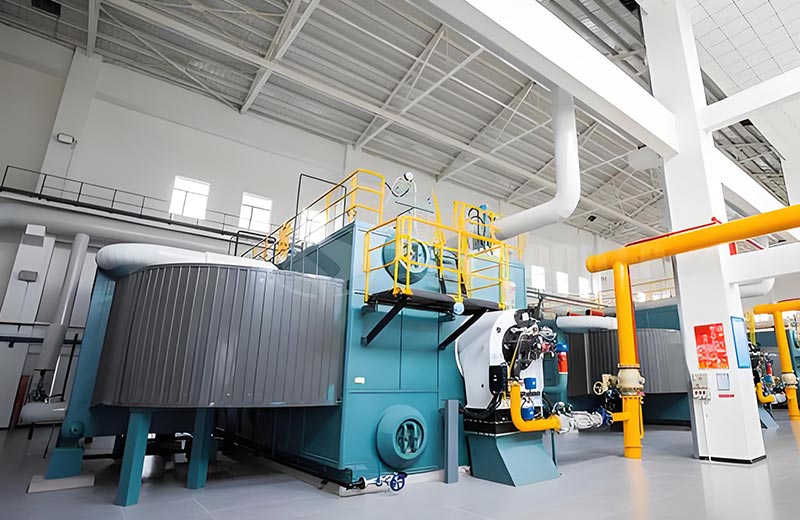The type of boiler usually used in biopharmaceutical plants is the biomass gas boiler, which is mainly used to provide the required steam and thermal energy to meet the heating and steam needs of the production process, also known as a gas steam boiler, which is widely used in pharmaceutical and other industrial production.These boilers are usually designed with advanced vapor-water separation devices to ensure steam quality, efficient operation of gas boilers, lower pollution emissions and compliance with environmental requirements.In this paper, we will discuss in detail the water quality requirements and testing indicators for gas-fired boilers in biopharmaceutical plants.

Different types of gas boilers in different areas require different types of water quality. When choosing water for boilers in biopharmaceutical plants, the appropriate water quality should be selected according to the specific type of boiler and working conditions.
1, biopharmaceutical plant gas boiler raw water testing of the core indicators include: turbidity, hardness, pH, dissolved oxygen and oil content.
PH: Reflects the acidity or alkalinity of the water and is generally required to be between 7-9. This indicator is crucial for the stable operation of the boiler.
Total hardness: reflecting the content of calcium, magnesium and other hardness ions in water, generally required between 50-300mg/L. Excessive hardness will lead to scaling of the boiler wall, affecting the normal operation of the equipment.
Dissolved Oxygen (DO): reflecting the content of dissolved oxygen in water, generally required to be between 5-8mg/L. Too high dissolved oxygen will accelerate the corrosion of the boiler, too low may affect the combustion efficiency of the boiler.
Turbidity: Turbidity is a measure of the amount of suspended matter in the water, which may come from impurities in the raw water. High turbidity can lead to an increase in deposits in the boiler, which can affect heat transfer efficiency.
Oil content: Oil substances in the water can form deposits in the boiler, affecting heat transfer efficiency and potentially causing safety problems. Therefore, oil substances in the water need to be tested and removed.
2, gas steam boiler pot water testing of the core indicators include pH, hardness, dissolved oxygen, chloride ion content, alkalinity and dissolved solids. These indicators are essential to ensure the safe operation of the boiler and extend its service life.
pH: It is an indicator of the acidity or alkalinity of a solution. For boilers, maintaining a certain alkalinity is beneficial in preventing corrosion and scaling. The pH value of the boiler water should be maintained within a certain range, for example, when the rated steam pressure is ≤2.5MPa, the pH value should be in the range of 10.0~12.0.
Hardness: refers to the content of calcium and magnesium ions in the water, high hardness can easily lead to boiler scaling, affecting heat transfer efficiency. Different rated steam pressure boiler feed water hardness standard parameter requirements are different, for example, rated steam pressure <3.8MPa boiler feed water hardness standard parameter requirements should be ≤ 0.03mmol/L.
Dissolved Oxygen Content:Excessive levels accelerate boiler corrosion, especially in steel boilers. Different rated steam pressure boiler feed water dissolved oxygen standard parameters are different, for example, rated steam pressure ≤ 1.0MPa, feed water dissolved oxygen standard parameters should be ≤ 0.10mg / L.
Chlorine Ion Levels:One of the main components of water that corrodes metals, high levels can lead to serious corrosion problems. The chlorine content of water softener after regeneration shall not be more than 1.1 times of the chlorine content of incoming water.
Alkalinity:It has an important effect on the acid-base balance inside the boiler, too high or too low can be harmful to the boiler equipment. When there is no superheater, the full alkalinity of the boiler water is generally in the range of 4.0~24.0mmol/L, and the phenolphthalein alkalinity is generally in the range of 2.0~16.0mmol/L.
Dissolved Solids: Also known as evaporation residue, indicates the total salt content of the water. Changes in the dissolved solids content of pot water can be directly reflected in the degree of concentration of pot water, too high easily caused by the deterioration of steam quality, need to control its content through reasonable sewage.
In summary, the water quality requirements and testing indicators of biomass gas boilers in biopharmaceutical factories are very strict, involving a number of aspects and indicators. Only by ensuring that the water quality meets the relevant standards and requirements can we ensure the stable operation and productivity of the boiler. Biopharmaceutical plants should regularly test and treat the boiler water quality to ensure the smooth running of the production process.